- Home
- Jack London
Adventure Page 8
Adventure Read online
Page 8
Somehow, as he pondered and watched her, it seemed as if he sat in church at home listening to the choir-boys chanting. She reminded him of those boys, or their voices, rather. The same sexless quality was there. In the body of her she was woman; in the mind of her she had not grown up. She had not been exposed to ripening influences of that sort. She had had no mother. Von, her father, native servants, and rough island life had constituted her training. Horses and rifles had been her toys, camp and trail her nursery. From what she had told him, her seminary days had been an exile, devoted to study and to ceaseless longing for the wild riding and swimming of Hawaii. A boy's training, and a boy's point of view! That explained her chafe at petticoats, her revolt at what was only decently conventional. Some day she would grow up, but as yet she was only in the process.
Well, there was only one thing for him to do. He must meet her on her own basis of boyhood, and not make the mistake of treating her as a woman. He wondered if he could love the woman she would be when her nature awoke; and he wondered if he could love her just as she was and himself wake her up. After all, whatever it was, she had come to fill quite a large place in his life, as he had discovered that afternoon while scanning the sea between the squalls. Then he remembered the accounts of Berande, and the cropper that was coming, and scowled.
He became aware that she was speaking.
«I beg pardon,» he said. «What's that you were saying?»
«You weren't listening to a word-I knew it,» she chided. «I was saying that the condition of the Flibberty-Gibbet was disgraceful, and that to-morrow, when you've told the skipper and not hurt his feelings, I am going to take my men out and give her an overhauling. We'll scrub her bottom, too. Why, there's whiskers on her copper four inches long. I saw it when she rolled. Don't forget, I'm going cruising on the Flibberty some day, even if I have to run away with her.»
While at their coffee on the veranda, Satan raised a commotion in the compound near the beach gate, and Sheldon finally rescued a mauled and frightened black and dragged him on the porch for interrogation.
«What fella marster you belong?» he demanded. «What name you come along this fella place sun he go down?»
«Me b'long Boucher. Too many boy belong along Port Adams stop along my fella marster. Too much walk about.»
The black drew a scrap of notepaper from under his belt and passed it over. Sheldon scanned it hurriedly.
«It's from Boucher,» he explained, «the fellow who took Packard's place. Packard was the one I told you about who was killed by his boat's-crew. He says the Port Adams crowd is out-fifty of them, in big canoes-and camping on his beach. They've killed half a dozen of his pigs already, and seem to be looking for trouble. And he's afraid they may connect with the fifteen runaways from Lunga.»
«In which case?» she queried.
«In which case Billy Pape will be compelled to send Boucher's successor. It's Pape's station, you know. I wish I knew what to do. I don't like to leave you here alone.»
«Take me along then.»
He smiled and shook his head.
«Then you'd better take my men along,» she advised. «They're good shots, and they're not afraid of anything-except Utami, and he's afraid of ghosts.»
The big bell was rung, and fifty black boys carried the whale-boat down to the water. The regular boat's-crew manned her, and Matauare and three other Tahitians, belted with cartridges and armed with rifles, sat in the stern-sheets where Sheldon stood at the steering-oar.
«My, I wish I could go with you,» Joan said wistfully, as the boat shoved off.
Sheldon shook his head.
«I'm as good as a man,» she urged.
«You really are needed here,» he replied.
«There's that Lunga crowd; they might reach the coast right here, and with both of us absent rush the plantation. Good-bye. We'll get back in the morning some time. It's only twelve miles.»
When Joan started to return to the house, she was compelled to pass among the boat-carriers, who lingered on the beach to chatter in queer, ape-like fashion about the events of the night. They made way for her, but there came to her, as she was in the midst of them, a feeling of her own helplessness. There were so many of them. What was to prevent them from dragging her down if they so willed? Then she remembered that one cry of hers would fetch Noa Noah and her remaining sailors, each one of whom was worth a dozen blacks in a struggle. As she opened the gate, one of the boys stepped up to her. In the darkness she could not make him out.
«What name?» she asked sharply. «What name belong you?»
«Me Aroa,» he said.
She remembered him as one of the two sick boys she had nursed at the hospital. The other one had died.
«Me take 'm plenty fella medicine too much,» Aroa was saying.
«Well, and you all right now,» she answered.
«Me want 'm tobacco, plenty fella tobacco; me want 'm calico; me want 'm porpoise teeth; me want 'm one fella belt.»
She looked at him humorously, expecting to see a smile, or at least a grin, on his face. Instead, his face was expressionless. Save for a narrow breech-clout, a pair of ear-plugs, and about his kinky hair a chaplet of white cowrie-shells, he was naked. His body was fresh-oiled and shiny, and his eyes glistened in the starlight like some wild animal's. The rest of the boys had crowded up at his back in a solid wall. Some one of them giggled, but the remainder regarded her in morose and intense silence.
«Well?» she said. «What for you want plenty fella things?»
«Me take 'm medicine,» quoth Aroa. «You pay me.»
And this was a sample of their gratitude, she thought. It looked as if Sheldon had been right after all. Aroa waited stolidly. A leaping fish splashed far out on the water. A tiny wavelet murmured sleepily on the beach. The shadow of a flying-fox drifted by in velvet silence overhead. A light air fanned coolly on her cheek; it was the land-breeze beginning to blow.
«You go along quarters,» she said, starting to turn on her heel to enter the gate.
«You pay me,» said the boy.
«Aroa, you all the same one big fool. I no pay you. Now you go.»
But the black was unmoved. She felt that he was regarding her almost insolently as he repeated:
«I take 'm medicine. You pay me. You pay me now.»
Then it was that she lost her temper and cuffed his ears so soundly as to drive him back among his fellows. But they did not break up. Another boy stepped forward.
«You pay me,» he said.
His eyes had the querulous, troubled look such as she had noticed in monkeys; but while he was patently uncomfortable under her scrutiny, his thick lips were drawn firmly in an effort at sullen determination.
«What for?» she asked.
«Me Gogoomy,» he said. «Bawo brother belong me.»
Bawo, she remembered, was the sick boy who had died.
«Go on,» she commanded.
«Bawo take 'm medicine. Bawo finish. Bawo my brother. You pay me. Father belong me one big fella chief along Port Adams. You pay me.»
Joan laughed.
«Gogoomy, you just the same as Aroa, one big fool. My word, who pay me for medicine?»
She dismissed the matter by passing through the gate and closing it. But Gogoomy pressed up against it and said impudently:
«Father belong me one big fella chief. You no bang 'm head belong me. My word, you fright too much.»
«Me fright?» she demanded, while anger tingled all through her.
«Too much fright bang 'm head belong me,» Gogoomy said proudly.
And then she reached for him across the gate and got him. It was a sweeping, broad-handed slap, so heavy that he staggered sideways and nearly fell. He sprang for the gate as if to force it open, while the crowd surged forward against the fence. Joan thought rapidly. Her revolver was hanging on the wall of her grass house. Yet one cry would bring her sailors, and she knew she was safe. So she did not cry for help. Instead, she whistled for Satan, at the same time calling him b
y name. She knew he was shut up in the living room, but the blacks did not wait to see. They fled with wild yells through the darkness, followed reluctantly by Gogoomy; while she entered the bungalow, laughing at first, but finally vexed to the verge of tears by what had taken place. She had sat up a whole night with the boy who had died, and yet his brother demanded to be paid for his life.
«Ugh! the ungrateful beast!» she muttered, while she debated whether or not she would confess the incident to Sheldon.
CHAPTER XI-THE PORT ADAMS CROWD
«And so it was all settled easily enough,» Sheldon was saying. He was on the veranda, drinking coffee. The whale-boat was being carried into its shed. «Boucher was a bit timid at first to carry off the situation with a strong hand, but he did very well once we got started. We made a play at holding a court, and Telepasse, the old scoundrel, accepted the findings. He's a Port Adams chief, a filthy beggar. We fined him ten times the value of the pigs, and made him move on with his mob. Oh, they're a sweet lot, I must say, at least sixty of them, in five big canoes, and out for trouble. They've got a dozen Sniders that ought to be confiscated.»
«Why didn't you?» Joan asked.
«And have a row on my hands with the Commissioner? He's terribly touchy about his black wards, as he calls them. Well, we started them along their way, though they went in on the beach to kai-kai several miles back. They ought to pass here some time to-day.»
Two hours later the canoes arrived. No one saw them come. The house-boys were busy in the kitchen at their own breakfast. The plantation hands were similarly occupied in their quarters. Satan lay sound asleep on his back under the billiard table, in his sleep brushing at the flies that pestered him. Joan was rummaging in the store-room, and Sheldon was taking his siesta in a hammock on the veranda. He awoke gently. In some occult, subtle way a warning that all was not well had penetrated his sleep and aroused him. Without moving, he glanced down and saw the ground beneath covered with armed savages. They were the same ones he had parted with that morning, though he noted an accession in numbers. There were men he had not seen before.
He slipped from the hammock and with deliberate slowness sauntered to the railing, where he yawned sleepily and looked down on them. It came to him curiously that it was his destiny ever to stand on this high place, looking down on unending hordes of black trouble that required control, bullying, and cajolery. But while he glanced carelessly over them, he was keenly taking stock. The new men were all armed with modern rifles. Ah, he had thought so. There were fifteen of them, undoubtedly the Lunga runaways. In addition, a dozen old Sniders were in the hands of the original crowd. The rest were armed with spears, clubs, bows and arrows, and long-handled tomahawks. Beyond, drawn up on the beach, he could see the big war-canoes, with high and fantastically carved bows and sterns, ornamented with scrolls and bands of white cowrie shells. These were the men who had killed his trader, Oscar, at Ugi.
«What name you walk about this place?» he demanded.
At the same time he stole a glance seaward to where the Flibberty– Gibbet reflected herself in the glassy calm of the sea. Not a soul was visible under her awnings, and he saw the whale-boat was missing from alongside. The Tahitians had evidently gone shooting fish up the Balesuna. He was all alone in his high place above this trouble, while his world slumbered peacefully under the breathless tropic noon.
Nobody replied, and he repeated his demand, more of mastery in his voice this time, and a hint of growing anger. The blacks moved uneasily, like a herd of cattle, at the sound of his voice. But not one spoke. All eyes, however, were staring at him in certitude of expectancy. Something was about to happen, and they were waiting for it, waiting with the unanimous, unstable mob-mind for the one of them who would make the first action that would precipitate all of them into a common action. Sheldon looked for this one, for such was the one to fear. Directly beneath him he caught sight of the muzzle of a rifle, barely projecting between two black bodies, that was slowly elevating toward him. It was held at the hip by a man in the second row.
«What name you?» Sheldon suddenly shouted, pointing directly at the man who held the gun, who startled and lowered the muzzle.
Sheldon still held the whip hand, and he intended to keep it.
«Clear out, all you fella boys,» he ordered. «Clear out and walk along salt water. Savvee!»
«Me talk,» spoke up a fat and filthy savage whose hairy chest was caked with the unwashed dirt of years.
«Oh, is that you, Telepasse?» the white man queried genially. «You tell 'm boys clear out, and you stop and talk along me.»
«Him good fella boy,» was the reply. «Him stop along.»
«Well, what do you want?» Sheldon asked, striving to hide under assumed carelessness the weakness of concession.
«That fella boy belong along me.» The old chief pointed out Gogoomy, whom Sheldon recognized.
«White Mary belong you too much no good,» Telepasse went on. «Bang 'm head belong Gogoomy. Gogoomy all the same chief. Bimeby me finish, Gogoomy big fella chief. White Mary bang 'm head. No good. You pay me plenty tobacco, plenty powder, plenty calico.»
«You old scoundrel,» was Sheldon's comment. An hour before, he had been chuckling over Joan's recital of the episode, and here, an hour later, was Telepasse himself come to collect damages.
«Gogoomy,» Sheldon ordered, «what name you walk about here? You get along quarters plenty quick.»
«Me stop,» was the defiant answer.
«White Mary b'long you bang 'm head,» old Telepasse began again. «My word, plenty big fella trouble you no pay.»
«You talk along boys,» Sheldon said, with increasing irritation. «You tell 'm get to hell along beach. Then I talk with you.»
Sheldon felt a slight vibration of the veranda, and knew that Joan had come out and was standing by his side. But he did not dare glance at her. There were too many rifles down below there, and rifles had a way of going off from the hip.
Again the veranda vibrated with her moving weight, and he knew that Joan had gone into the house. A minute later she was back beside him. He had never seen her smoke, and it struck him as peculiar that she should be smoking now. Then he guessed the reason. With a quick glance, he noted the hand at her side, and in it the familiar, paper-wrapped dynamite. He noted, also, the end of fuse, split properly, into which had been inserted the head of a wax match.
«Telepasse, you old reprobate, tell 'm boys clear out along beach. My word, I no gammon along you.»
«Me no gammon,» said the chief. «Me want 'm pay white Mary bang 'm head b'long Gogoomy.»
«I'll come down there and bang 'm head b'long you,» Sheldon replied, leaning toward the railing as if about to leap over.
An angry murmur arose, and the blacks surged restlessly. The muzzles of many guns were rising from the hips. Joan was pressing the lighted end of the cigarette to the fuse. A Snider went off with the roar of a bomb-gun, and Sheldon heard a pane of window– glass crash behind him. At the same moment Joan flung the dynamite, the fuse hissing and spluttering, into the thick of the blacks. They scattered back in too great haste to do any more shooting. Satan, aroused by the one shot, was snarling and panting to be let out. Joan heard, and ran to let him out; and thereat the tragedy was averted, and the comedy began.
Rifles and spears were dropped or flung aside in a wild scramble for the protection of the cocoanut palms. Satan multiplied himself. Never had he been free to tear and rend such a quantity of black flesh before, and he bit and snapped and rushed the flying legs till the last pair were above his head. All were treed except Telepasse, who was too old and fat, and he lay prone and without movement where he had fallen; while Satan, with too great a heart to worry an enemy that did not move, dashed frantically from tree to tree, barking and springing at those who clung on lowest down.
«I fancy you need a lesson or two in inserting fuses,» Sheldon remarked dryly.
Joan's eyes were scornful.
«There was no detonator on it,» s
he said. «Besides, the detonator is not yet manufactured that will explode that charge. It's only a bottle of chlorodyne.»
She put her fingers into her mouth, and Sheldon winced as he saw her blow, like a boy, a sharp, imperious whistle-the call she always used for her sailors, and that always made him wince.
«They're gone up the Balesuna, shooting fish,» he explained. «But there comes Oleson with his boat's-crew. He's an old war-horse when he gets started. See him banging the boys. They don't pull fast enough for him.»
«And now what's to be done?» she asked. «You've treed your game, but you can't keep it treed.»
«No; but I can teach them a lesson.»
Sheldon walked over to the big bell.
«It is all right,» he replied to her gesture of protest. «My boys are practically all bushmen, while these chaps are salt-water men, and there's no love lost between them. You watch the fun.»
He rang a general call, and by the time the two hundred labourers trooped into the compound Satan was once more penned in the living– room, complaining to high heaven at his abominable treatment. The plantation hands were dancing war-dances around the base of every tree and filling the air with abuse and vituperation of their hereditary enemies. The skipper of the Flibberty-Gibbet arrived in the thick of it, in the first throes of oncoming fever, staggering as he walked, and shivering so severely that he could scarcely hold the rifle he carried. His face was ghastly blue, his teeth clicked and chattered, and the violent sunshine through which he walked could not warm him.
«I'll s-s-sit down, and k-k-keep a guard on 'em,» he chattered. «D-d-dash it all, I always g-get f-fever when there's any excitement. W-w-wh-what are you going to do?»

 The Son of the Wolf
The Son of the Wolf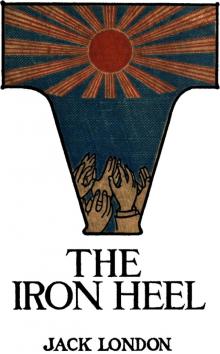 The Iron Heel
The Iron Heel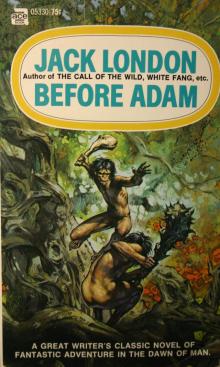 Before Adam
Before Adam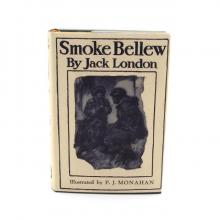 Smoke Bellew
Smoke Bellew The Call of the Wild
The Call of the Wild The Valley of the Moon Jack London
The Valley of the Moon Jack London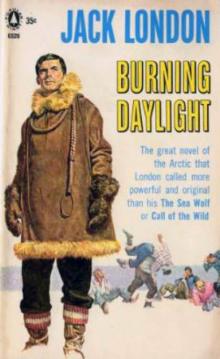 Burning Daylight
Burning Daylight The Sea Wolf
The Sea Wolf White Fang
White Fang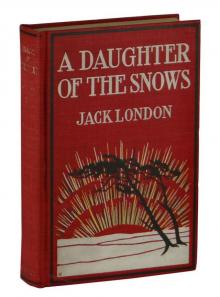 A Daughter of the Snows
A Daughter of the Snows The Night-Born
The Night-Born A Son Of The Sun
A Son Of The Sun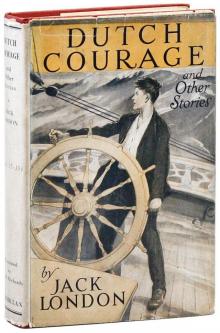 Dutch Courage and Other Stories
Dutch Courage and Other Stories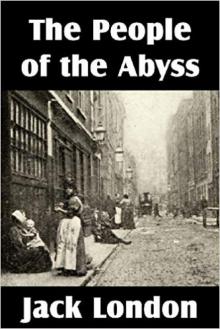 The People of the Abyss
The People of the Abyss Michael, Brother of Jerry
Michael, Brother of Jerry Love of Life, and Other Stories
Love of Life, and Other Stories Lost Face
Lost Face The Road
The Road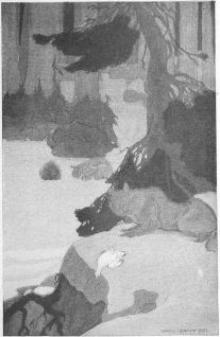 Love of Life
Love of Life The Turtles of Tasman
The Turtles of Tasman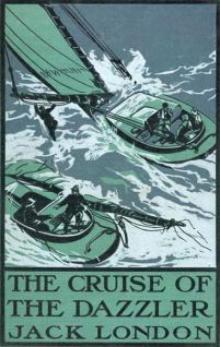 The Cruise of The Dazzler
The Cruise of The Dazzler The Heathen
The Heathen The Scab
The Scab The Faith of Men
The Faith of Men Adventure
Adventure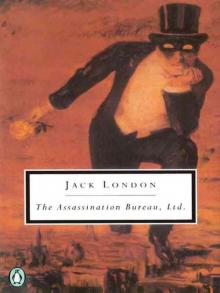 The Assassination Bureau, Ltd.
The Assassination Bureau, Ltd. The Call of the Wild, White Fang, and Other Stories
The Call of the Wild, White Fang, and Other Stories The Call of the Wild and Selected Stories
The Call of the Wild and Selected Stories Jerry of the Islands
Jerry of the Islands Hearts of Three
Hearts of Three The House of Pride
The House of Pride Moon-Face and Other Stories
Moon-Face and Other Stories Children of the Frost
Children of the Frost South Sea Tales
South Sea Tales The Strength of the Strong
The Strength of the Strong The Jacket (The Star-Rover)
The Jacket (The Star-Rover) The Little Lady of the Big House
The Little Lady of the Big House John Barleycorn
John Barleycorn ADaugter of Snows
ADaugter of Snows The Mutiny of the Elsinore
The Mutiny of the Elsinore Northland Stories
Northland Stories Tales of the Fish Patrol
Tales of the Fish Patrol Call of the Wild and White Fang (Barnes & Noble Classics Series)
Call of the Wild and White Fang (Barnes & Noble Classics Series) The Valley of the Moon
The Valley of the Moon The Cruise of the Snark
The Cruise of the Snark The Game
The Game An Autobiography of Jack London
An Autobiography of Jack London